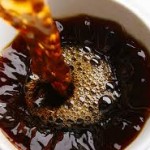Is Caffeine Helping or Hurting Your Fitness Goals?
 Caffeine is something that many people these days depend on to get them through long, busy days – and I’m one of them. Whether you prefer it from your morning cup of coffee (80 – 150mg per 7oz), green tea (24 – 40mg per 8oz), cola products (35 – 60mg per can) or energy drinks (80 – 250 mg per serving), it’s all the same. Caffeine can also show up in other things such as chocolate and cocoa items, energy nut packs, energy jelly beans, energy gum – you name it. Personally, especially when I’m working out, I depend on caffeine (from a sugar free energy drink). It helps me push harder through my workout, gives me just enough energy and makes me more focused on what I need to do. Lately, I’ve been reading a lot of studies on caffeine and its effect on weight loss and performance. There are so many different opinions (on whether it promotes weight loss or keeps you from losing those last couple pounds) that it makes it so hard to decipher what’s proven and what really works. That’s where I come in. Lets just dive right in and I’ll go over some of the facts. Ultimately, I’m going to leave the choice up to you whether you want to make it a part of your day or not.
Caffeine is something that many people these days depend on to get them through long, busy days – and I’m one of them. Whether you prefer it from your morning cup of coffee (80 – 150mg per 7oz), green tea (24 – 40mg per 8oz), cola products (35 – 60mg per can) or energy drinks (80 – 250 mg per serving), it’s all the same. Caffeine can also show up in other things such as chocolate and cocoa items, energy nut packs, energy jelly beans, energy gum – you name it. Personally, especially when I’m working out, I depend on caffeine (from a sugar free energy drink). It helps me push harder through my workout, gives me just enough energy and makes me more focused on what I need to do. Lately, I’ve been reading a lot of studies on caffeine and its effect on weight loss and performance. There are so many different opinions (on whether it promotes weight loss or keeps you from losing those last couple pounds) that it makes it so hard to decipher what’s proven and what really works. That’s where I come in. Lets just dive right in and I’ll go over some of the facts. Ultimately, I’m going to leave the choice up to you whether you want to make it a part of your day or not.
Common benefits and advantages of caffeine
- It can promote weight loss by burning up fat more efficiently.
- It increases mental alertness
- It will increase exercise performance
- It’s a mood lifter
- Suppresses appetite
- Is a mild diuretic
The bodies best energy supply lies in our fat stores. When caffeine gets into that storage supply, you better believe you’re going to feel like a well-tuned monster truck. After only a few minutes, caffeine travels from your mouth to every organ in your body – increasing your heart rate and relaxing smooth muscles. Dopamine levels soar sky high, giving you the same feeling as if you took an amphetamine. Caffeine pumps adrenalin all over, giving you that surge of energy you might feel after drinking that first morning cup of coffee. Too much does the opposite effect, so in this case – less is more. Over consumption could lead to the following…
Common disadvantages of caffeine
- Causes sleeplessness and anxiety if you consume too much, or too late
- Can be detrimental to building lean muscle
- Can be addictive, causing withdraws
- Can increase your blood pressure
For those who are extra sensitive to caffeine, you might experience shaking and trembling in your hands, rapid heart rate, dizziness, anxiety, fatigue and insomnia (especially if consumed late in the day). If you decide you want to stop drinking or taking caffeine, you could get withdraw symptoms like headaches, fatigue, irritability, depression and flu-like symptoms. If you’re trying to build muscle, caffeine might set you back by burning off those extra calories you need to build healthy muscles. In the same breath though, caffeine is widely used in the body building scene because of all the mental energy they need to be able to handle all the stress they put on their body.
If you consume caffeine in moderation, I do believe that the benefits outweigh the negatives. If you are or have been sensitive to caffeine in the past, I wouldn’t recommend you start taking it for an energy boost or performance enhancer. There are so many natural non-stimulant supplements out there that are just as effective for weight loss and energy. Most healthy people can consume up to 200 – 300 mg of caffeine every day without having any harmful side effects. Death can occur with doses close to 5,000 mg. To stay within a safe zone, 2.3 – 4.5mg for every pound of body weight will keep you away from any adverse cardiovascular attacks, says the “American College of Emergency Physicians.” To lower or quit your caffeine consumption all together, you’ll want to slowly decrease the amount each day instead of quitting cold turkey. This will lower the chances of withdraw symptoms, without effecting too much of your quality of life too much.
What are your thoughts on caffeine? Have you ever had any adverse effects? How do you consume your caffeine – coffee, energy drinks, supplements? Comment below!
